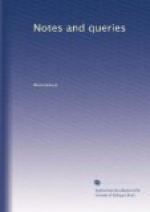MARK ANTONY LOWER.
Lewes.
In reply to the Query respecting the sword of William the Conqueror (Vol. iii., p. 24.), I am enabled to inform you that the sword, and also the coronation robes, of William the Conqueror, were, together with the original “Roll of Battel,” kept in the church or chapel of Battel Abbey until it was dismantled at the Reformation; when they were transferred to the part of the abbey which remained, and which became the possession and habitation of Sir Anthony Browne, Master of the Horse to Henry VIII. These precious relics continued in the possession of his descendants, who were created Lords Mountacute; and when Battel Abbey was sold by them to the ancestor of the present owner, they conveyed them to Cowdray Park, Sussex, where they remained until they were destroyed in the lamentable fire which burned down that mansion; and which, by a singular coincidence, took place on the same day that its owner, the last male representative of the Brownes Lords Mountacute, was drowned in a rash attempt to descend the falls of Schaffhausen in a boat.
E.H.Y.
* * * * *
MEANING OF EISELL.
(Vol. ii., pp. 241. 286. 315. 329)
After all that has been written on this subject in “NOTES AND QUERIES,” from MR. SINGER’S proposition of wormwood in No. 46., to MR. HICKSON’S approval of it in No. 51., the question remains substantially where Steevens and Malone had left it so many years agone.
It is not necessary to discuss whether vinegar, verjuice, or wormwood be the preferable translation of the Shakspearian word; for before either of them can be received, the advocate is bound to {67} accommodate his exposition to Shakspeare’s sentence, and to “get over the drink up,” which still stands in his way as it did in that of Malone.
MR. SINGER get over the difficulty by simply saying “to drink up was commonly used for simply to drink.” The example he quotes, however,—
“I
will drink
Potions of eysell,”—
is not to his purpose; it is only an equivalent by the addition of the words “potions of” to give it the same definite character. Omit those words, and the question remains as before.
MR. HICKSON (Vol. ii., p. 329.) has laid down “a canon of criticism for the guidance of commentators in questions of this nature,” so appropriate and valuable, that I cannot except to be bound by it in these remarks; and if in the sequel his own argument (and his friend’s proposition to boot) shall be blown up by his own petard, it will show the instability of the cause he has espoused.
“Master the grammatical construction of the passage in question (if from a drama, in it dramatic and scenic application), deducing therefrom the general sense, before you attempt to amend or fix the meaning of a doubtful word.”
Such is the canon; and Mr. HICKSON proceeds to observe, in language that must meet the approval of every student of the immortal bard, that—




